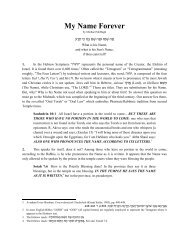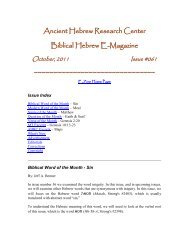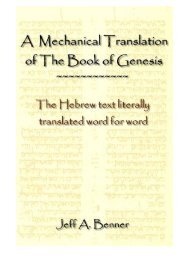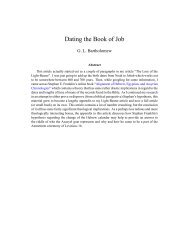Ancient Hebrew Language and Alphabet
Ancient Hebrew Language and Alphabet
Ancient Hebrew Language and Alphabet
You also want an ePaper? Increase the reach of your titles
YUMPU automatically turns print PDFs into web optimized ePapers that Google loves.
<strong>Ancient</strong> <strong>Hebrew</strong> <strong>Language</strong> <strong>and</strong> <strong>Alphabet</strong><br />
forecasts a "rain" shower for tomorrow, different people<br />
will interpret the word "rain" in different ways, with a<br />
circumstantial biasness. The bride <strong>and</strong> groom who are<br />
prepared for an outdoor wedding view this news with a<br />
negative connotation, while to the farmer in the middle of<br />
a drought season, it has a positive connotation. To the<br />
<strong>Ancient</strong> <strong>Hebrew</strong> nomads the word "rain" was usually<br />
equated with "life" since without it, their very existence<br />
would not be possible.<br />
Another example of the importance of underst<strong>and</strong>ing the<br />
cultural setting can be seen in the word "dinner". To my<br />
gr<strong>and</strong>parents <strong>and</strong> their generation, "dinner" was the main<br />
meal of the day eaten at noon <strong>and</strong> a light "supper" was<br />
eaten in the evening. Where as today, dinner is the main<br />
meal eaten in the evening. There are countless examples<br />
in our own English language of how word meanings<br />
change over time according to the culture.<br />
Many times our cultural influence will give a different<br />
definition to words that was not intended by the Biblical<br />
authors. For example the Bible speaks of keeping <strong>and</strong><br />
breaking the comm<strong>and</strong>s of God. The words "keep" <strong>and</strong><br />
"break" are usually interpreted as "obedience" <strong>and</strong><br />
"disobedience". But this is not the <strong>Ancient</strong> Hebraic<br />
meaning of these words.<br />
The <strong>Hebrew</strong> word for word "keep" is rmX / shamar)<br />
which literally means "to guard, protect, <strong>and</strong> cherish"<br />
while the <strong>Hebrew</strong> word for "break" is rrp / parar <strong>and</strong><br />
literally means "to trample underfoot". The <strong>Ancient</strong><br />
<strong>Hebrew</strong> underst<strong>and</strong>ing of these words is not about<br />
mechanical obedience <strong>and</strong> disobedience of his comm<strong>and</strong>s,<br />
18






